 Petzlover
Petzlover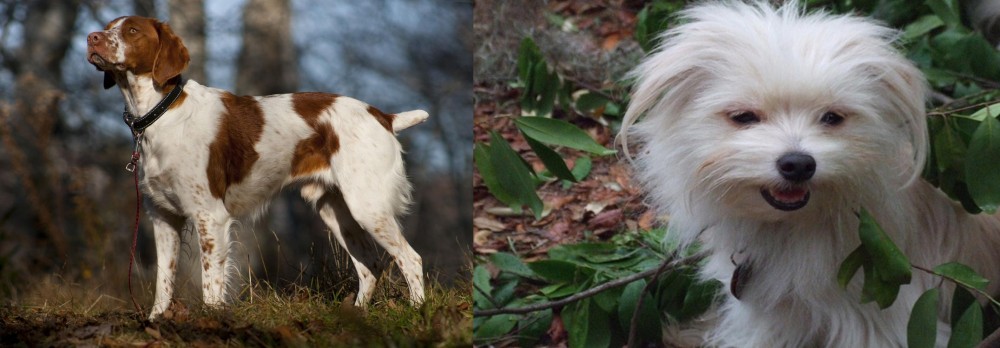 Brittany is originated from France but Malti-Pom is originated from United States. Brittany may grow 24 cm / 10 inches higher than Malti-Pom. Brittany may weigh 15 kg / 34 pounds more than Malti-Pom. Both Brittany and Malti-Pom has almost same life span. Brittany may have more litter size than Malti-Pom. Brittany requires Low Maintenance. But Malti-Pom requires Moderate Maintenance
Brittany is originated from France but Malti-Pom is originated from United States. Brittany may grow 24 cm / 10 inches higher than Malti-Pom. Brittany may weigh 15 kg / 34 pounds more than Malti-Pom. Both Brittany and Malti-Pom has almost same life span. Brittany may have more litter size than Malti-Pom. Brittany requires Low Maintenance. But Malti-Pom requires Moderate Maintenance
 One of the most intense bird dog breeds in existence is the Brittany, bred for hunt. The breed used to be called the Brittany Spaniel, but since the breed is closer to a setter or pointer, that moniker has been dropped. The Brittany is named for the French Province in which they were originally developed. Sometime from the 17th to the 19th centuries, the breed was developed. Images of a very similar dog can be found on 17th century paintings and tapestries. However, the first written description comes from 1850 by a Reverend Davies, describing a hunting episode. The breed was recognized officially in the early part of the 20th century and made a splash at the 1900 Paris Dog Show.
One of the most intense bird dog breeds in existence is the Brittany, bred for hunt. The breed used to be called the Brittany Spaniel, but since the breed is closer to a setter or pointer, that moniker has been dropped. The Brittany is named for the French Province in which they were originally developed. Sometime from the 17th to the 19th centuries, the breed was developed. Images of a very similar dog can be found on 17th century paintings and tapestries. However, the first written description comes from 1850 by a Reverend Davies, describing a hunting episode. The breed was recognized officially in the early part of the 20th century and made a splash at the 1900 Paris Dog Show.
The first official standards were written in about 1907 and the breed was recognized by the American Kennel Club (AKC) in 1934.The Brittany is expected to point to and then retrieve birds and other small ground game. Because the Brittany both points and retrieves they are known in the U.K. as a Hunt, Point and Retrieve breed or an HPR, and they have more Dual Champions than the rest of the AKC Sporting group.
There are actually two types of Brittanys in the minds of many breeders. There is the “French” Brittany and the “American” Brittany. When the breed arrived in the United States in 1931 they became immensely popular in a short period of time. In 1942 American Breeders began the American Brittany Club, rewriting the French standard to fit the dog they knew. Today there are definitely difference between the two sub-sets that can easily be seen. The French dog is smaller than the American dog. The American dog is a runner pacing ahead of the hunter while the French dog works more closely with their human companions. Another visible difference is that the French accept black spotted Brittanys, while in the United States a black spotted coat is considered a fault. Both sub-sets are known for their willingness to follow human directions, their eagerness for the hunt, and their agility and speed.
Unfortunately, the European wars took their toll on this breed as they did on many others. Following the second World War, their numbers in Europe were drastically reduced. The French had stop breeding them altogether during the war. It was in this depleted gene pool that the French agreed to accept the black spotted Brittany. Along with the U.S., Canada also does not recognize the black spotted Brittany.
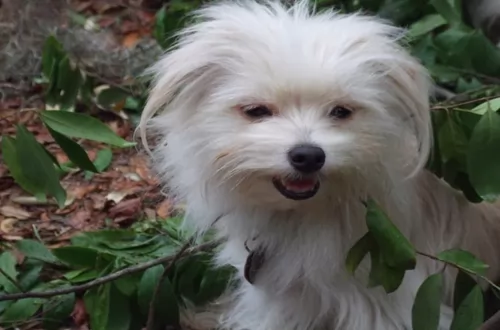 The sweet little Malti Pom is a dog which comes from crossing two purebreds – the Maltese Poodle and the Pomeranian.
The sweet little Malti Pom is a dog which comes from crossing two purebreds – the Maltese Poodle and the Pomeranian.
The appearance of this dog will vary according to how much of each breed is in the dog. The exact origins of the Maltipom breed are unknown but many new dog breeds have originated in the United States.
The Maltipom is also not recognized by the AKC because it’s a hybrid of two pure breeds and not looked upon as a new breed. It is however recognized by the American Canine Hybrid Club.
 The Brittany is much like other hunting dogs – pointers and retrievers – in size and stature. He is solid and strong but not heavy. He is compact with an average size head and floppy ears, docked tails or short natural tails, and expressively intelligent looking eyes. He is athletic, energetic, and alert. He has a long, elastic and free gait. The French dog is smaller and the dog with black spots is accepted. The American Brittany is larger and only a tri-color of orange, liver and white is acceptable.
The Brittany is much like other hunting dogs – pointers and retrievers – in size and stature. He is solid and strong but not heavy. He is compact with an average size head and floppy ears, docked tails or short natural tails, and expressively intelligent looking eyes. He is athletic, energetic, and alert. He has a long, elastic and free gait. The French dog is smaller and the dog with black spots is accepted. The American Brittany is larger and only a tri-color of orange, liver and white is acceptable.
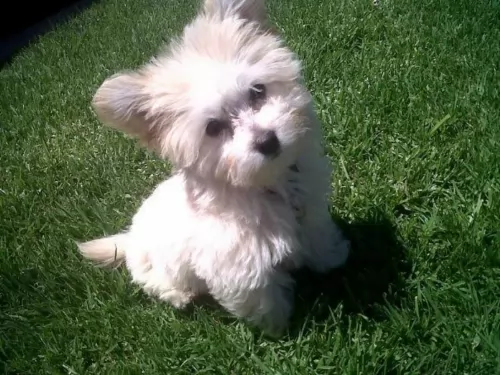 The Malti-Pom is a crossbreed, so pinpointing his exact size can be somewhat difficult, but you can expect him to be in the region of 20 to 28cm and weigh in at about 2 to 5kg.
The Malti-Pom is a crossbreed, so pinpointing his exact size can be somewhat difficult, but you can expect him to be in the region of 20 to 28cm and weigh in at about 2 to 5kg.
Both the Maltese and the Pomeranian are both toy dogs, so the Malti-Pom is almost sure to be a small dog. His appearance will also vary depending on which side he inherits most of his looks from. Generally though, he has a long coat of straight, soft hair.
He is a low shedder and with the poodle side of him he is looked upon as being hypoallergenic. The coat can be cream, apricot, white or black as well as a combination of these colors.
This is such a friendly, amicable little dog. He is good with children and can get on well with other pets in the home.Children should be taught to be gentle with any dog, but particularly a small one like this.
The Malti-pom is extremely loyal and affectionate with its family members, but ends to form a special bond with one member of its family.
These little dogs are generally reserved with strangers. They are well-behaved, sociable and can mix well with children and pets in the home. These toy dogs are clever so you won't battle with him with training and socialization.
Although the Maltipom looks cute and is an amicable dog, he can bark quite aggressively when he encounters strangers who he believes might harm his family. He makes a good watchdog.
 The Brittany is particularly trainable and friendly. They love to play and are sweet-natured. They don’t due well with harsh correction though and a stern look will cause them to wither. Socialize them young or they can become shy around strangers. They are loyal and family oriented. They can easily become attached to their humans.
The Brittany is particularly trainable and friendly. They love to play and are sweet-natured. They don’t due well with harsh correction though and a stern look will cause them to wither. Socialize them young or they can become shy around strangers. They are loyal and family oriented. They can easily become attached to their humans.
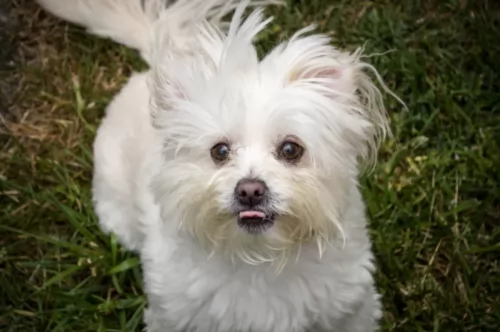 Because your Malti-Pom comes from two different dog breeds, you can’t really say what kind of personality traits he will inherit.
Because your Malti-Pom comes from two different dog breeds, you can’t really say what kind of personality traits he will inherit.
Both the Maltese and the Pom are small lap-type dogs who are essentially companion dogs. You can be sure your Malti-pom is going to be cute, social, energetic, vibrant and loving. They are able to adapt well to life in the city or the countryside and a nice walk every day will go down well in terms of exercise. It give your pet a chance to get outdoors and to sniff new scents.
With the Maltese and the Pom being the two parents of this dog breed, you can be sure that you’re going to have a splendid little pet who is guaranteed to bring lots of smiles into your home from his jovial, entertaining ways
 The breed is a hardy one and Brittanys are mostly healthy dogs. In Europe 1 in 5 dogs dies of old age and that age is usually 14 or 15 years. They do have a few issues that they may be susceptible to. These would include:
The breed is a hardy one and Brittanys are mostly healthy dogs. In Europe 1 in 5 dogs dies of old age and that age is usually 14 or 15 years. They do have a few issues that they may be susceptible to. These would include:
 Fortunately, the Maltipom is considered to be a healthy dog, and he can live with you for a good number of years with good care. The Maltipom could develop heart issues.
Fortunately, the Maltipom is considered to be a healthy dog, and he can live with you for a good number of years with good care. The Maltipom could develop heart issues.
Heart disease is fairly common in dogs and some symptoms will include a cough, loss of appetite and he might tire easily. One of the common types of heart disease is degenerative valvular disease, where the heart valves fail.
It is believed that degenerative valve disease is a heart disease which accounts for about 75% of all heart disease in dogs. Diagnosing heart disease requires a number of different testing methods.
 Don’t overfeed your Brittany. Keep him at hunting weight by feeding a half a cup up to 2 cups per day depending on the size of your dog and activity levels. Serve this in two meals not one.
Don’t overfeed your Brittany. Keep him at hunting weight by feeding a half a cup up to 2 cups per day depending on the size of your dog and activity levels. Serve this in two meals not one.
Ears – prone to infections – make sure that you check them and wipe them out routinely to prevent infections.
Hip Dysplasia – bones don’t fit well into joints – this can be genetic or otherwise, causing lameness and arthritis. If severe it can require surgery to correct.
Epilepsy – mild or serious seizures are possible. This can be genetic/hereditary but is set off by an infectious disease of the brain, head injury, poison, tumor, or metabolic disorder. There is no cure, but medication can be very effective.
Hypothyroidism – Low levels of thyroid hormone – can cause drooping eyelids, obesity, lethargy, mental difficulties or irregular heat cycles or all of this. Medication is available as it is for humans but must be taken daily for the rest of the dog’s life
Canine Discoid Lupus Erythematosus – autoimmune disease that is rare in dogs. Cats and humans can also have it. It is a skin disease and does not become the more serious and deadly Systemic Lupus. The Discoid version of this disease causes loss of pigmentation and a scaling on the nose which can then progress to the skin around the ears, eyes and genitals. There could be ulcerated lesions and tissue death in more severe cases. Sun exposure can make the condition worse.
The Brittany is a hunting dog that acts like a pointer but will retrieve fowl and birds in the water or on land. If you don’t hunt, the Brittany can still be your family dog. They need lots of exercise and mental stimulation. They need a job if they are not going to hunt and expect them to be distracted by every bird they see. Try flyball, agility, FAST CAT, field trials and dock diving. They are very task oriented and have boundless energy. They excel at obedience and confirmation as well.
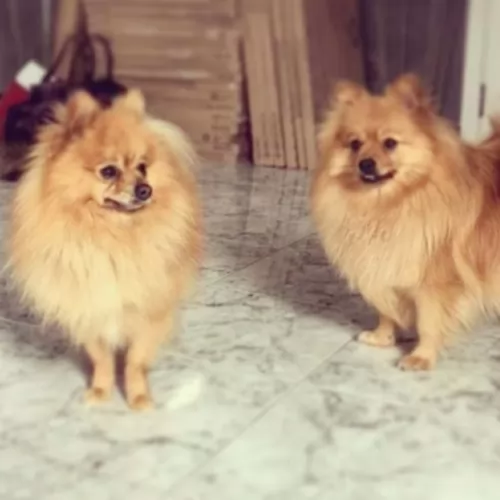 The Maltipom is a tiny dog, and that’s an advantage actually as he isn’t going to cost you too much to feed. Half a cup of food in he morning and another in the evening will keep him satisfied.
The Maltipom is a tiny dog, and that’s an advantage actually as he isn’t going to cost you too much to feed. Half a cup of food in he morning and another in the evening will keep him satisfied.
If you give him commercially manufactured food, choose a high quality one specially made for small dogs. You can chop up cooked chicken, brown rice or pasta and some cooked vegetables finely and add this to his dry kibble from time to time as a tasty treat.
A tiny little bit of raw meat once in a while will also keep him healthy. Keep things simple – don’t try all sorts of weird foods with him as he can battle with digestive problems.
Groom your pet. Brush him at least twice a week. Check his eyes and ears for infection and remember to brush his teeth at least 2 or 3 times a week with special canine toothbrush and toothpaste.
Make sure he is exercised. He'll love a walk each day.